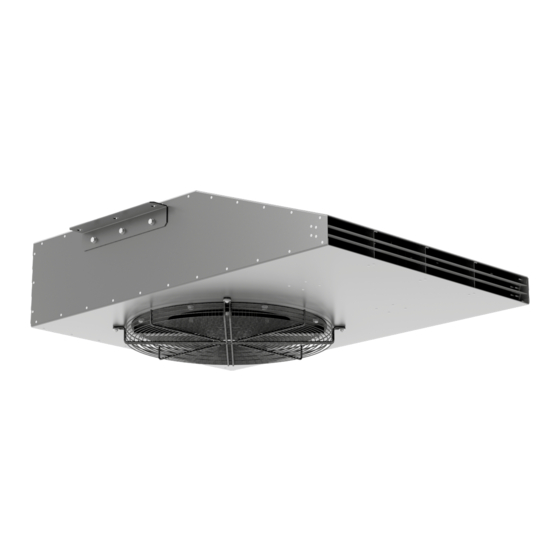
Table of Contents
Advertisement
Quick Links
Advertisement
Table of Contents

Summary of Contents for AIR-TRANSFER AT-ICF
- Page 1 USER’S MANUAL AT-ICF Impulse centrifugal fan...
-
Page 2: Table Of Contents
Air-Transfer CONTENTS Safety requirements ..................................2 Purpose ........................................ 4 Delivery set ......................................4 Designation key ....................................5 Technical data ....................................5 Design and operating principle ............................7 Mounting and set-up .................................. 7 Connection to power mains ..............................8 Commissioning ....................................11 Technical maintenance ................................ - Page 3 Air-Transfer Do not close or block the intake or extract vents in order to ensure the efficient air flow. Do not sit on the unit and do not put objects on it. The information in this user’s manual was correct at the time of the document’s preparation.
-
Page 4: Purpose
Air-Transfer PURPOSE The ICF series impulse centrifugal fan is applied in ventilation and smoke extraction systems of underground parkings and garages. The fans with fire resistance ratings of +200 °C, +300 °C and +400 °C are designed for 2 hours of non-stop operation for smoke extraction. -
Page 5: Designation Key
Air-Transfer DESIGNATION KEY I C F X X X X Fan type Impulse centrifugal fan Thrust: 100N Number of poles: 4 (single-speed) 4/6 (double-speed) 4/8 (double-speed) Fire resistance: _ – up to 55 °C 200/2 – up to 200 °C/2 hours* 300/2 –... - Page 6 Air-Transfer Thrust Max. operating Sound pressure Power supply Frequency Input Fire Model capacity (impulse) velocity temperature Lp(A) at a distance voltage [V] [Hz] power [kW] [min resistance [m /h] [m/s] [°C]* of 3 m [dB] 50N, single-speed ICF-50N-4 –25 – +55 °C 55 °C...
-
Page 7: Design And Operating Principle
Air-Transfer DESIGN AND OPERATING PRINCIPLE The fan casing is made of polymer coated steel. The Terminal block protection grille on the air inlet side prevents ingress of Electric motor foreign objects. The deflecting plates on the pressure side Impeller ensure equal air distribution and boost air draft. -
Page 8: Connection To Power Mains
Air-Transfer CONNECTION TO POWER MAINS DISCONNECT THE POWER SUPPLY PRIOR TO ANY OPERATIONS WITH THE UNIT. CONNECTION OF THE UNIT TO POWER MAINS IS ALLOWED BY A QUALIFIED ELECTRICIAN WITH A WORK PERMIT FOR THE ELECTRIC UNITS UP TO 1000 V AFTER CAREFUL READING OF THE PRESENT USER’S MANUAL. - Page 9 Air-Transfer Wiring diagrams Wiring diagram for the fan operation Wiring diagram for the fan operation with high Model with low speed speed Single-speed -50N-4 ... -85N-4 ... -100N-4 ... ~400 V 50/60 Hz Double-speed -50N-4/6 ... -85N-4/6 ... -100N-4/6 ...
- Page 10 Air-Transfer ASYNCHRONOUS ELECTRIC MOTOR STARTING METHODS There are several methods for starting asynchronous squirrel-cage electric motors. The most common methods are: direct-on-line (DOL), with a soft starter (SS) or with a frequency converter (FC). Direct-on-line starting In case of direct-on-line starting (i.e. by connecting the motor to the electric mains with a simple line contactor), the motor starting time significantly increases due to high inertia of the impeller, which, in turn, results in high in-rush starting currents in the circuit.
-
Page 11: Commissioning
Air-Transfer Let us review three variations of a heavy start: 1. The feed line performance is barely sufficient or insufficient to maintain the induced current. Typical symptoms: Upon starting the circuit breakers at the system input are tripped; the lights, certain relays and contactors go off, and the supply generator shuts down. -
Page 12: Technical Maintenance
Air-Transfer TECHNICAL MAINTENANCE DISCONNECT THE UNIT FROM POWER SUPPLY BEFORE ANY MAINTENANCE OPERATIONS! PRIOR TO COMMENCING ANY TECHNICAL MAINTENANCE PUT UP A PROHIBITORY SIGN ON THE FAN STARTING PANEL: “DO NOT SWITCH ON! MEN AT WORK!” AVOID LIQUID SPILLS ON THE MOTOR! DO NOT USE AGGRESSIVE SOLVENTS AND... - Page 13 Air-Transfer POSSIBLE REASONS AND TROUBLESHOOTING Problem Possible reasons Troubleshooting The fan does not get started. No power supply. Check the automatic circuit breaker. Check the electric connections. Jammed motor. Carefully check the fan impeller for possible seizure and eliminate it, if necessary. If the impeller is in order, replace the electric motor.
- Page 14 Air-Transfer The fan supplies less air than Wrong choice of the fan. Re-calculate the parameters and select the right fan. expected. Wrong direction of the impeller rotation If necessary, change the impeller rotation direction by direction. changing the phase sequence on the electric motor terminals.
-
Page 15: Storage And Transportation Regulations
Air-Transfer STORAGE AND TRANSPORTATION REGULATIONS • Store the unit in the manufacturer’s original packaging box in a dry closed ventilated premise with temperature range from +5 °C to + 40 °C and relative humidity up to 70 %. • Storage environment must not contain aggressive vapors and chemical mixtures provoking corrosion, insulation, and sealing deformation. -
Page 16: Manufacturer's Warranty
Air-Transfer MANUFACTURER’S WARRANTY The product is in compliance with EU norms and standards on low voltage guidelines and electromagnetic compatibility. We hereby declare that the product complies with the provisions of Electromagnetic Compatibility (EMC) Directive 2014/30/EU of the European Parliament and of the Council, Low Voltage Directive (LVD) 2014/35/EU of the European Parliament and of the Council and CE-marking Council Directive 93/68/EEC.

Need help?
Do you have a question about the AT-ICF and is the answer not in the manual?
Questions and answers